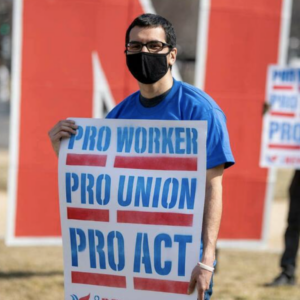This Labor Day, the real threat to election integrity isn’t at your polling place–it’s at your workplace.
Bolstered by the “most pro-union president” in the White House and his allies in Congress, labor leaders are confident they can finally eliminate the secret ballot vote in union elections. For American workers, the stakes couldn’t get any higher.
Unions have long fought to abolish the secret ballot vote. Instead, they push for what’s known as a “card check” system. This method merely requires the union to get a majority of employees to publicly sign a union authorization card. It’s a largely unregulated system that puts employees at risk for coercion, intimidation, and even bullying from union organizers.
A signed card means employees give the union the legal right to represent them in the workplace. But unions aren’t even legally required to make that fact clear. Employees may be tempted to sign a union card just to get organizers off their back, even if they don’t fully understand the consequences of signing. And once a labor union is put in place, it’s almost impossible for it to be removed.
The Protecting the Right to Organize (PRO) Act, a union-backed bill in Congress, would essentially eliminate the secret ballot vote in union elections in favor of this card check system. Unfortunately, that’s far from all this bill would do to squash worker choice.
The PRO Act includes a slew of other union-backed provisions that would threaten employee privacy, outlaw right-to-work laws in 27 states, and rope countless freelancers and gig workers into union membership by reclassifying them as full-time employees.
Another massive threat to employee choice sounds like it should be the most innocuous. It’s known as a “neutrality agreement.” These sneaky agreements are actually a way for a union to get full access to a workplace and its employees–making organizing as easy as possible.
These agreements give unions access to workers’ personal information, including home addresses. That means union representatives can bring their organizing campaign right to an employee’s front door. Neutrality agreements can also allow a union to organize through a card check, not a secret ballot election.
Particularly nasty labor unions will try to strong-arm employers into signing these agreements. Take the United Auto Workers, a union known for using a tactic called “corporate campaign” to get companies to sign such an agreement. These campaigns are meant to drive customers away from a company by harming its reputation. For instance, the union called in the help of Sen. Bernie Sanders (I-Vt.) when it was organizing a Nissan plant in Mississippi. The senator called the company out for being a “greedy corporation,” in an effort to damage its reputation and drive down sales.
Despite these union threats, the cards aren’t totally stacked against employees. The Employee Rights Act (ERA), a bill recently introduced in Congress by Sen. Tim Scott (R-S.C.), would codify essential workplace protections. They include the right to a secret ballot vote in union elections, protection for worker privacy, and criminalization of union threats. In addition to this much-needed update to our labor laws, the pro-worker campaign Workplace Election Integrity is dedicated to educating workers about the real union agenda, and how it threatens their choice in the workplace.
This Labor Day, instead of praising labor unions and their agenda that threatens worker choice, we should focus on bolstering workplace election integrity. That would really be something worth celebrating.


